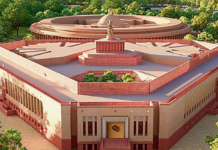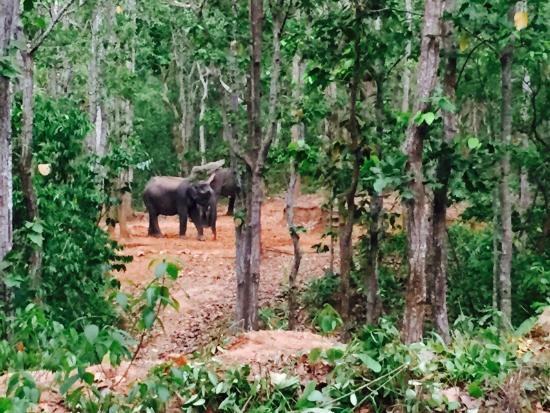We were terrified to see him running towards us, he was sweating, breathless and visibly tensed; ‘elephant elephant’ he whispered before he finished his words. I was ready with my camera and search light. We followed him to the spot, ahh! The dream came true…. A huge tusker just rampaging the entire banana plantation before us.
I have visited almost all the accessible forests of Odisha, but Kuladiha forest appeals me the most. Visited the place four times though, I get a special feeling on each visit. A small hilly forest around 270 Sqkm area but highly enriched biodiversity one finds here. It is a mixed deciduous forest dominated by the Sal trees. Like other forests of Odisha, one will not find animals roaming here and there freely (the fact remains constant for Odisha). But since we have made those left out animals addicted to man-made-salt licks, and if you remain alert whole night, you would surely come across lovely creatures licking salts.
Kuladiha is really a beautiful forest for watching birds and photographing them, every time you visit you will add a new species to your list. I personally have contributed many species for the Book “Birds of Kuladiha” from this forest. The dense vegetation both the big ‘sal’ trees and scrubs make the track light and shade all over; and a different kind of special notes of the single bird, ‘white-romped shama’ gives a special music you might have never heard of. In addition, this is the rich habitat of Bison, deer, Sumbar, Barking deer, wild boars and elephants, but not freely available like any other forests outside our state (thanks to our people and forest department).
14th April, 2018, at early morning, left Bhubaneswar for Kuldihaalong with my friend, I drove for four hour to reach the place. Sri Manoranjan Das, the son of the soil and the most knowledgeable guide of the forest, was waiting for us with all the amenities needed to stay overnight. The story will never be completed without mentioning him in detail, hence kept reserved for next chapter. Whenever visited I stayed at FRH Kuldiha, but due to some maintenance issue the same was not available, hence we led towards Jodachua rest house in the dense forest. The place is surrounded by deep trench as a protective measure for the staff with a wooden bridge connecting with the forest road. During the night the wooden planks are removed so that animals won’t be able to enter inside. When we checked in, there was no one except a young boy, Bishu! Kept my vehicle safe there and after a delicious ‘jungle lunch’, moved into the forest as usual in search of wildlife. Whole afternoon was cloudy and the forest was very dark, difficult in locating and shooting any bird, but walking inside jungle and listening the music of birds is something different, however we managed to take shots of few birds and by the evening we were back to the rest house.
We put two chairs outside, had tea and pokada prepared by Bishu. There was not light, no mobile signal, two dim lit bulbs powered by solar were enough, complete dark all around, a real feeling of staying in jungle, heard call of barking deer, terrifying sound of Owl nearby would frightened anyone; and the ‘thuk thuk’ sound of nightjar reminded me of my Guru Sri Suresh Mishra who called this bird ‘DEBATAA BINDHAANI’; and I explained to my friend as to why this is called ‘debataa bindhaani’. Debataabindhaani, an odia term meaning carpenter of God, that means when the carpenter was making the wooden log as Gods from inside the closed room, the sound came out like the one the nightjar call, hence the name !
In the meanwhile we heard some sound nearby and when put my search light on the salt-lick we saw many pairs of twinkling eyes like stars in the light, they were mixed species of wild boars, Sambar deer and bisons. It was too hot and humid, difficult to stay inside without fan, kept sitting there. My guide Sri Manaranjan and Bishu were busy for preparing dinner at the kitchen in the camp. My friend was happy as this was his first visit and said, “It really a lovely experience to stay in the real jungle in this condition, but one might die out of fear if alone”. Suddenly there was heavy downpour and we moved to the veranda, a cool n caressing wind touched us…ahhh! We needed the same for the moment, we could sleep keeping all the windows open so that we get relief of terrible humidity..
Manoranjan was ready with our dinner, when the rain stopped for a moment we finished our dinner. Then we planned to roam around the jungle whole night in the vehicle, but he cautioned us, “Sir it’s the jungle elephants, anything can happen, better we pass time talking here only till late night” and we agreed. That was the time I knew things about Manoranjan Das in detail.
We heard some sound; he left the place to take a round of the camp to see as to what made the sound. We were terrified to see him running towards us, he was sweating, breathless and visibly tensed; ‘elephant elephant’ he whispered before he finished his words. I was ready with my camera and search light. We followed him to the spot, ahh! The dream came true…. A huge tusker just rampaging the entire banana plantation before us. He whispered “Sir, please do not go so close, the tusker is excited and aroused its organ”. In my powerful search light, I could clearly see his organ for the first time. Such a beautiful scene comes once in life time and I decided to take the risk!! Asked Bishu to focus the light directly to its eyes till I finished shooting and he did exactly what I wanted. I kept shooting as many shots as I could till he was about to challenge us. He said, “Sir, it is excited and can even damage the rest house, lets climb” and we simply followed his instruction then. That was the right time to run away from him and take shelter on the roof top or else he would damage my vehicle parked there. But who sleeps? By the time the sky was clear and he was very near to our room, we simply observed his behaviour till 3 O’clock in the morning. He also stood still in a style, adjusted its tusk in a tree trunk and rested its body in another tree. It was standing still for hours, when asked, Manoranjan said that he sleeps in this position only. We also took rest as we had to wake up at 5.30 AM.
We got up early. The first thing we wanted to confirm as to whether the elephant had gone. But we were frightened at its very presence at close to our windows; I took few mobile clicks from inside without being noticed. We couldn’t come out, it was still loitering till 6.30 AM, then he was slowly moving out of the camp and I could take few shots before he vanished into the thick forest putting an end to my euphoric encounter!














































